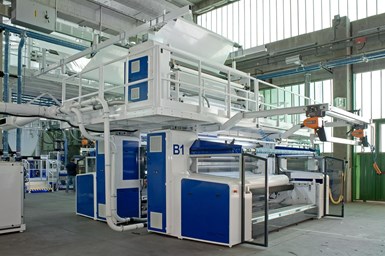Five-Layer Polyolefin-Dedicated Film Line
Five-layer line suited to handle PCR.
The new Polyblown 5-layer POD (polyolefin dedicated) series from Colines is designed for the production of polyolefin films and suitable for processing PCR. The production line has been recently redesigned and optimized, and during the last week of July, was showcased during an event for some selected customers.
Colines says the line is extremely energy efficient, pointing to low specific energy consumption rates that range from 0.32 to 0.38 kWh/kg (depending on the formulations).
Other notable features of the line include a user-friendly graphical interface of the software; excellent control of film tension and winding speed, achieved with the use of brushless motors; a sturdy, ergonomically friendly design; extremely low thickness tolerances; and high production capacities.
The line is supplied with four extruders equipped with liquid-cooled motors; a 500-mm coextrusion die; a dual-flow air ring; internal bubble cooling; a capacitive non-contact film-thickness sensor; primary and secondary bubble-cage and collapsing frames with carbon fiber rollers; an embedded oscillating takeoff; additional secondary nip; and a new surface/gap/center winder. The line can run at a maximum width of 270 mm.

Photo: Colines
During the customer event, the following films (highly rich metallocene formulations) were produced:
Lamination Film
- 55-µm thick, 2300-mm layflat width.
- Production rate: 550-650 kg/h depending on the formats.
- Energy consumption: 0.33-0.37 kWh/kg.
- Thickness tolerances: 2.5-3%.
Silo Bags
- 230-µm thick, 5 meters circumference.
- Production rate: 650-750 kg/h depending on the formats.
- Energy consumption: 0.32-0.35 kWh/kg.
- Thickness tolerances: 3-3.5%.
Agristretch Film
- 25-µm thick, multirolls with 2000-mm layflat width.
- Production rate: 400-500 kg/h depending on the formats.
- Energy consumption: 0.33-0.38 kWh/kg.
- Thickness tolerances: 3.5-4%.
Collation Shrink Film
- 50-µm thick, multirolls with 2500-mm layflat width.
- Production rate: 700-800 kg/h depending on the formats.
- Energy consumption: 0.32-0.37 kWh/kg.
- Thickness tolerance: 2.5-3%.
Related Content
-
Part 2 Medical Tubing: Use Simulation to Troubleshoot, Optimize Processing & Dies
Simulation can determine whether a die has regions of low shear rate and shear stress on the metal surface where the polymer would ultimately degrade, and can help processors design dies better suited for their projects.
-
How Screw Design Can Boost Output of Single-Screw Extruders
Optimizing screw design for a lower discharge temperature has been shown to significantly increase output rate.
-
Troubleshooting Screw and Barrel Wear in Extrusion
Extruder screws and barrels will wear over time. If you are seeing a reduction in specific rate and higher discharge temperatures, wear is the likely culprit.














